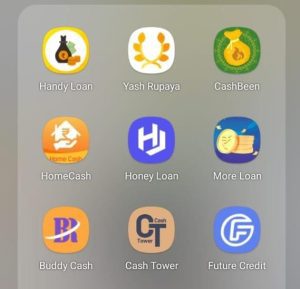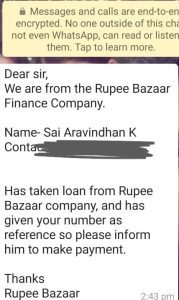
In the last one year, Tamil Nadu Police have identified 269 offending loan apps. (Supplied)
Narendran Srinivasa Raja, 22, a software engineer in Chennai, urgently needed ₹5,000. To get the money without any documentation, or having to borrow from friends or family, he downloaded the Rupee Bag application from App Store on his phone.
The app sought access to his contacts and also his bank details to transfer the money. Soon after, and much to his relief, the online money lending company approved his loan and credited the money instantly.
His relief was, however, short-lived.
To repay the loan, he again borrowed money by downloading another loan app. This process spiralled and by the end of the month, Narendran had downloaded 25-27 loan apps on his phone to keep the vicious cycle of borrowing and repayment going.

Loan apps, which were allegedly on the phone of the 22-year-old Narendran Srinivasa Raja who died by suicide in Chennai.
Soon, he started getting threatening calls from the loan app companies asking him to re-pay the money at a huge interest rate. The callers threatened to send messages to his contacts about his loan.
Unable to bear the stress and harassment, Narendran died by suicide at his home on 4 October.
***
A 24-year-old woman took a loan of ₹3,500 from an app named Dutta Rupee Fame. Not only was she asked to repay the money at an astronomical interest rate within few hours of borrowing, the company also sent derogatory messages about her to her friends and family.
The message read: “She is a prostitute. She slept with many people and her rate is only Rs 200.”

Screenshot of a message received by the friends and family of a 24-year-old woman by a loan app company.
Unlike Narendran, the 24-year-old informed her parents about the harassment, and filed a police complaint. The accused in the case was arrested from Bengaluru.
***
Narendran and the 24-year-old woman are among the thousands of people in Tamil Nadu who have become victims of illegal online loan apps which target those desperate for a loan and then use unscrupulous methods to extort huge amounts from them.
The problem is not restricted to Tamil Nadu. Across the country, several such cases have come to light.
The loan apps are basically applications that can be downloaded from the App Store to avail small loans within a short time without providing extensive documentation. Many of these apps are unauthorised entities operating illegally and they mainly target vulnerable, low-income groups.
For those who are desperate to get some quick money, these apps appear as saviours as the cash is credited almost instantly by just providing some basic details.
However, the trouble begins after the money is credited. The modus operandi of these loan apps is to harass and bully customers — often resorting to outright extortion and blackmail — into repaying the loan at exorbitant interest rates.
To be approved on App Store, a loan app has to declare that it charges a maximum of 36 percent interest per annum. But what they effectively charge is way over that.
“What they charge is not interest rate, but an extortion rate,” a police officer investigating the illegal loan apps told South First.
Even if the company does state a specific rate of interest at the time of giving the loan, in most cases it forces the customer to pay much more than the rate it mentioned initially.
According to Pawan Duggal, a cyber security expert who spoke to South First, a lot of details are hidden in the fineprint of the terms and conditions which most people don’t read or tend to miss while reading.
The ability of these apps to threaten its borrowers derives from the access they receive to the private and personal data.
For example, while downloading the app, these apps ask users to grant access to his/her contact list, gallery, personal data, among other things, which is then misused to harass them. In short, a person trades his/her privacy in return for money.
Apart from multiple threatening calls from loan recovery agents — according to reports, many call centres are based in Bengaluru — the companies send unfavourable text messages about the loanee to those in his/her contact list.
In addition, there have been several instance of the the apps threatening to leak nude or obscene pictures of the customer by morphing the images they accessed from the user’s gallery.
For instance, in November 2020, a 23-year-old IT professional named Sai Aravind died by suicide in Chennai, allegedly due to mental harassment by a money lending app named Rupee Bazaar.
When Aravind failed to repay the loan, his friends started getting calls from random numbers. The company personnel used derogatory language and intimidated them. Later, the lenders also created WhatsApp groups named ‘Aravind is a fraud’ and posted pictures of him in the groups.
Some of his friends also received text messages such as: “Sai Aravindan K has taken loan from Rupee Bazaar company, and has given your number as reference. So please inform him to make payment.”

Message sent by the loan app to friends of Sai Aravind.
These are some of the predatory methods used by the illegal money lending apps.
Speaking to South First, Amaraesh Pujari, Tamil Nadu Director General of Police (DGP), Cyber Crime Wing, said his department had identified 269 offending loan apps in the last one year.
Of these, 194 apps have been taken down from the App Store due to the intervention of the Tamil Nadu police, and 75 of are still active despite multiple requests to the App Store to remove them.
According to the police, some of the offending apps which continue to be operational include: Loan Bro, Kredit Bee, Credit Box, Daily Loan, Coin Cash, KOKO Loan app, Small Credit, Orange Loan App, PayMe India, etc.
However, the senior IPS officer pointed out that, in addition to the mobile apps, several money lending websites have also been mushrooming, which is making it even more challenging for the authorities to crack down on these illegal entities.
At least 1,500 websites have come to the “adverse notice” of the cyber-crime wing so far.
According to officials, around 5,000 complaints of harassment by loan apps/websites have been registered in the last one-and-half years in Tamil Nadu.
For cyber crime authorities, one of the main challenges in going after the illegal money lending apps is the slow response from the companies that host these apps.
“Whenever we seek details of the loan apps, the response from the app hosts is slow. There are so many obstacles and stone-walling from the hosts when it comes to tracing the culprits,” DGP Pujari told South First.
Things get even more complicated when the apps are owned and operated from outside India, especially from countries like China. In some cases, certain apps operate for a number of days and shut shop, which makes it difficult for law enforcement agencies to track them.
Cyber security expert Pavan Duggal also raised concerns about how the online loan apps are among the least regulated in the app ecosystem.
“There is no legal framework to regulate these money lending apps. The guidelines of the Reserve Bank of India (RBI) are applicable only to the organised sector. But 80-85 percent of the loan apps come under the unorganised sector,” he told South First.
“There is a complete grey zone when it comes to these apps. A good way to tackling this menace is by ensuring that we have proper legal provisions under the Information Technology Act and effective enforcement of it, combined with building awareness among consumers,” he added.
Similar concerns were flagged by Tamil Nadu Police with the Union Ministry of Home Affairs as well. According to a senior official, they have requested the ministry to look into the issue and impose more curbs on such fraudulent apps.
Importantly, in a bid to rein in the illegal loan apps, the RBI in September was asked by the Union Finance Ministry to prepare a “white list” of all the legal loan apps and the Ministry of Electronics and Information Technology has been tasked with ensuring only such applications are available on App Stores.
According to experts and officials, one of the most effective ways to deal with this problem is by increasing awareness among people about the dangers of using illegal money lending apps or websites.
“Long-term peace is more important than short-term money,” said Duggal, while opining that online loan apps must be a “complete no-no”.
As for the cyber crime police, several initiatives are being taken to enhance cyber awareness of the people, and to explain to them about the pitfalls of the rogue apps.
Putting out a word of caution, ADGP Pujari said: “There is nothing fair about the loan apps. They are indulging in criminality. My advice to the people would be: Avoid these money lending apps and websites as much as possible.”
“If you are in a desperate situation, at least make sure you use reputed, verified apps from the App Store. But the more you stay away from them, the better.”
(In case you are being harassed by illegal loan apps, contact local police or use the 1930 helpline, which is the National Cyber Crime Reporting Portal)

May 15, 2024

May 12, 2024

May 12, 2024

May 03, 2024

May 02, 2024

May 02, 2024